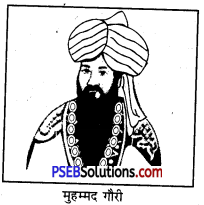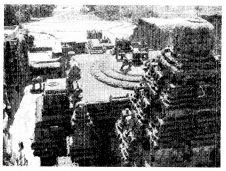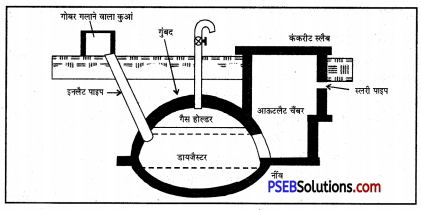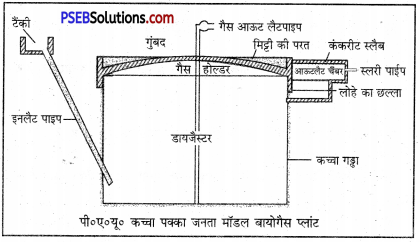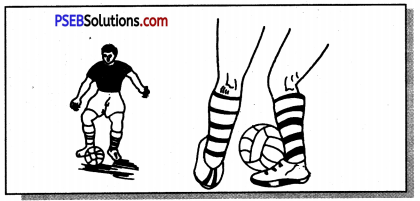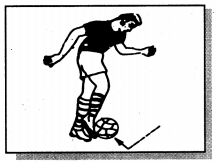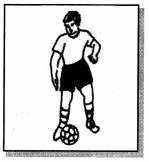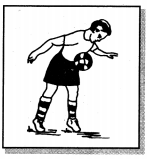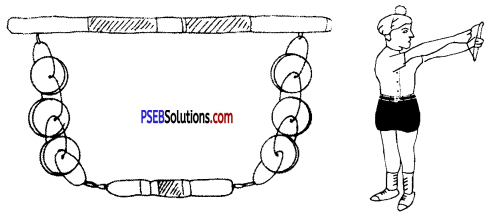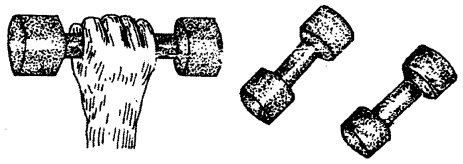Punjab State Board PSEB 12th Class Political Science Book Solutions Chapter 12 हित तथा दबाव समूह Textbook Exercise Questions and Answers.
PSEB Solutions for Class 12 Political Science Chapter 12 हित तथा दबाव समूह
दीर्घ उत्तरीय प्रश्न-
प्रश्न 1.
दबाव समूह की परिभाषा लिखो। दबाव समूहों की मुख्य विशेषताओं का वर्णन करो।। (Define Pressure Groups and explain its main characteristics.)
अथवा
“प्रभावक’ गुटों को परिभाषित कीजिए और उनकी विशेषताओं की चर्चा करें।। (Define Prssure Groups and discuss their characteristics.)
उत्तर-
वर्तमान राजनीतिक युग की महत्त्वपूर्ण देन दबाव समूहों (Pressure Groups) का विकास है जो आजकल सभी लोकतन्त्रीय देशों में पाए जाते हैं। कार्ल जे० फ्रेडरिक ने दबाव समूहों को “दल के पीछे सकिय जन” (“The living Public behind the Parties”) कहा है। पहले इन समूहों को घृणा की दृष्टि से देखा जाता था। उन्हें एक बुरी शक्ति माना जाता था जो लोकतन्त्र की जड़ों पर प्रहार करती है, किन्तु अब स्थिति बदल गई है। अब उन्हें आवश्यक बुराई के रूप में राजनीतिक क्रियाशीलता के लिए आवश्यक समझा जाने लगा है। राजनीतिक क्षेत्र में नीति निर्धारण और प्रशासन में दिन-प्रतिदिन इनके बढ़ते हुए प्रत्यक्ष अथवा अप्रत्यक्ष प्रभाव के कारण विश्व के सभी देशों में इनका अध्ययन किया जा रहा है।
दबाव समूह का अभिप्राय (Meaning of Pressure Groups)—साधारण भाषा में दबाव समूह विशेष हितों से सम्बन्धित व्यक्तियों के ऐसे समूह होते हैं जो विधायकों को प्रभावित करके अपने उद्देश्यों और हितों के पक्ष में समर्थन प्राप्त करते हैं। ये राजनीतिक दल अथवा संगठन नहीं होते हैं बल्कि ये राजनीतिक दलों से भिन्न होते हैं।
1. ओडीगार्ड (Odegard) ने दबाव समूह का अर्थ बताते हुए कहा है, “एक दबाव समूह ऐसे लोगों का औपचारिक संगठन है जिनके एक अथवा अनेक सामान्य उद्देश्य और स्वार्थ हैं और जो घटनाओं के क्रम में विशेष रूप में सार्वजनिक नीति के निर्माण और शासन को इस प्रकार प्रभावित करने का प्रयत्न करे कि उनके अपने हितों की रक्षा और वृद्धि हो सके।
2. सी० एच० ढिल्लों (C. H. Dhillon) के अनुसार, “हित समूह ऐसे व्यक्तिों का समूह है जिनके उद्देश्य समान होते हैं। जब हित समूह अपने इन उद्देश्यों की पूर्ति के लिए सरकार की सहायता चाहने लगते हैं, तब इन्हें दबाव समूह कहा जाता है।” (“An Interest Group is an association of people having a mutual concern. They become in turn a pressure group as they seek government aid in accomplishing what is advantageous of them.”)
3. मैनर वीनर (Myron Weiner) के अनुसार, “दबाव अथवा हित समूह से हमारा अभिप्राय ऐसे किसी ऐच्छिक रूप से संगठित समूह से होता है जो सरकार के संगठन से बाहर रह कर सरकारी अधिकारियों की नियुक्ति, सरकार की नीति, इसका प्रशासन तथा इसके निर्णय को प्रभावित करने का यत्न करता है।”
4. एन० सी० हण्ट (N. C. Hunt) के अनुसार, “दबाव समूह ऐसा संगठन है जो सार्वजनिक पद की ज़िम्मेदारी स्वीकार किए बिना सरकार की नीतियों को प्रभावित करने का प्रयत्न करता है।” : “A pressure group is an organisation which seeks to influence governmental policies without at the same time being willing to accept the responsibility of public office.”)
5. वी० ओ० की (V.O. Key) के अनुसार, “हित समूह ऐसे असार्वजनिक संगठन (Private Associations) है जिनका निर्माण सार्वजनिक नीति को प्रभावित करने के लिए किया जाता है। यह उम्मीदवारों के उत्तरदायित्व की अपेक्षा सरकार को प्रभावित करने का प्रयत्न करके अपने हित साधन में लगे रहते हैं।”
इन परिभाषाओं में संगठन शब्द पर बल दिया गया है, जिससे ये परिभाषाएं सीमित हो गई हैं क्योंकि इन परिभाषाओं के आधार पर उन्हीं समूहों को हित समूह स्वीकार किया जा सकता है जिनका औपचारिक संगठन हो। अतः जिन समूहों का औपचारिक संगठन नहीं है उन्हें हित समूहों में सम्मिलित नहीं किया जा सकता। आर्थर बेण्टले (Arthur Bentley) का विचार है कि हित समूह की परिभाषा संगठन के आधार पर न करके, क्रिया के आधार पर की जानी चाहिए। उसके अनुसार, “समूह समाज के लोगों का कोई एक भाग है, जिसे किसी ऐसे भौतिक पुंज के रूप में नहीं जोकि व्यक्तियों के अन्य पुंजों से पृथक् हो (Not as a physical mass cut off from other masses of men) बल्कि सामूहिक क्रिया के रूप में (As a mass activity) माना गया है जो कि अपने में भाग लेने वाले व्यक्तियों पर इसी प्रकार की अन्य सामूहिक क्रियाओं में भाग लेने पर कोई रुकावट उत्पन्न नहीं करता।”
दबाव समूह की उपर्युक्त परिभाषाओं के आधार पर हम इस परिणाम पर पहुंचते हैं कि दबाव समूह राजनीतिक दलों की भान्ति किसी कार्यक्रम के आधार पर निर्वाचकों को प्रभावित नहीं करते हैं बल्कि वे किन्हीं विशेष हितों से सम्बन्धित होते हैं। वे राजनीतिक संगठन नहीं होते हैं और न ही चुनाव के लिए अपने उम्मीदवार खड़े करते हैं। वे तो अपने समूह विशेष के लिए सरकारी नीति और सरकारी ढांचे को प्रभावित करते हैं, राजनीतिक दल न होते हुए भी दलों के समान संगठित होते हैं, जिनकी सदस्यता, उद्देश्य, संगठन, एकता, प्रतिष्ठा और साधन होते हैं। इन समूहों का निर्माण विशेष हितों के लिए होता है। वे अपने उद्देश्यों को पूर्ण करने के लिए जनता की सहानुभूति अपने पक्ष में करने का प्रयत्न करते हैं। वे सरकार पर ऐसी किसी नीति को न अपनाने के लिए जो उनके हितों के प्रतिकूल हो समाचार-पत्र, पुस्तकों, रेडियो तथा सार्वजनिक सम्बन्ध आदि माध्यमों द्वारा प्रभाव डालते हैं।
दबाव समूहों के लक्षण विशेषताएँ अथवा प्रकृति (CHARACTERISTICS OR NATURE OF PRESSURE GROUPS)-
दबाव समूहों की विभिन्न परिभाषाओं से स्पष्ट पता चलता है कि ये न तो हित समूहों की भान्ति पूर्ण रूप से अराजनीतिक होते हैं और न ही राजनीतिक दलों की भान्ति पूर्णतः राजनीतिक होते हैं। दबाव समूह के मुख्य लक्षण निम्नलिखित हैं-
1. औपचारिक संगठन (Formal Organisation)-दबाव समूह का प्रथम लक्षण यह है कि वह औपचारिक रूप से संगठित व्यक्तियों के समूह होते हैं। व्यक्तियों के इस समूह को बिना संगठन के दबाव समूह नहीं कहा जा सकता। दबाव समूह के लिए औपचारिक संगठन का होना अनिवार्य है। दबाव समूह का अपना संविधान, अपने उद्देश्य और अपने पदाधिकारी होते हैं। हो सकता है कि कोई समूह बिना औपचारिक संगठन के बहुत प्रभावशाली हो, परन्तु ऐसे समूह को दबाव समूह के स्थान पर शक्ति गुट (Power Group) कहना अधिक उचित होता है।
2. विशेष स्व-हित (Special Self-interest)-दबाव समूहों की स्थापना का आधार किसी विशेष स्व-हित की सिद्धि होता है। परन्तु इसका अर्थ यह नहीं कि दबाव समूहों के सामान्य उद्देश्य नहीं होते हैं। अनेक दबाव समूह विशेष कर पेशेवर समूह सामान्य हित का ही लक्ष्य रखते हैं, परन्तु फिर भी इस बात में सच्चाई है कि विशेष स्वहित विभिन्न व्यक्तियों को एक समूह में बांध कर रखता है। दबाव समूह की एकता का आधार ही इसके सदस्यों में एक जैसे हित का होना है। जिन व्यक्तियों के हितों की समानता होती है वे ही दबाव समूह का रूप ले लेते हैं ताकि सरकार को प्रभावित करके अपने हितों की रक्षा कर सकें।
3. ऐच्छिक सदस्यता (Voluntary Membership)-दबाव समूह की सदस्यता ऐच्छिक होती है। दबाव समूह का सदस्य बनना या न बनना व्यक्ति की इच्छा पर निर्भर करता है। किसी व्यक्ति को किसी विशेष दबाव समूह का सदस्य बनने के लिए मजबूर नहीं किया जा सकता। यदि कोई व्यक्ति किसी दबाव समूह का सदस्य बनने के बाद यह महसूस करे कि उसके हित इस समूह विशेष के द्वारा पूरे नहीं होते हैं तो वह इस समूह की सदस्यता छोड़ सकता है।
4. सर्वव्यापक प्रकृति (Universal in Nature)-दबाव समूह सभी प्रकार की राजनीतिक व्यवस्थाओं में पाए जाते हैं। यह ठीक है कि लोकतान्त्रिक शासन व्यवस्था में दबाव समूह अधिक पाए जाते हैं और उनकी भूमिका भी सर्वाधिकार व स्वेच्छाचारी शासन व्यवस्था की अपेक्षा अधिक महत्त्वपूर्ण होती है। परन्तु सर्वाधिकारवादी व्यवस्था में भी दबाव समूह पाए जाते हैं। चीन में दबाव समूह पाए जाते हैं। अफ्रीका व लेटिन अमेरिका के अनेक स्वेच्छाधारी राज्यों में दबाव समूह पाए जाते हैं।
5. राजनीतिक क्रिया अभिमुखी (Political action Oriented)-दबाव समूह स्वयं राजनीतिक संगठन नहीं होते परन्तु ये राजनीतिक क्रिया को प्रभावित करने का प्रयास करते हैं। ये चुनावों में प्रत्यक्ष तौर पर भाग नहीं लेते और शासन व्यवस्था से अलग रहते हैं परन्तु ये राजनीतिक दलों और राजनीतिक गतिविधियों को प्रभावित करते हैं।
6. उत्तरदायित्व का अभाव (Lack of Responsibility)-दबाव समूहों की एक अन्य विशेषता यह है कि समूह सत्ता का लाभ तो उठाते हैं परन्तु उत्तरदायित्व का वहन नहीं करते। दबाव समूह सत्तारूढ़ दल पर दबाव डालते हैं ताकि नीतियों का निर्माण उनके पक्ष में हो। परन्तु दबाव समूह किसी भी कार्य के लिए जनता के प्रति उत्तरदायी नहीं होते।
7. अमान्य संवैधानिक संगठन (Extra Constitutional Bodies) ‘दबाव समूहों को संवैधानिक मान्यता प्राप्त नहीं होती क्योंकि इनका वर्णन संविधान में नहीं किया गया होता। परन्तु दबाव समूह देश की राजनीति में महत्त्वपूर्ण भूमिका निभाते हैं और शासन को प्रभावित करते हैं।
8. राजनीतिक सत्ता प्राप्ति का उद्देश्य नहीं (Aim is not to acquire Political Power)-दबाव समूहों का उद्देश्य राजनीतिक सत्ता प्राप्त करना नहीं होता अर्थात् इनका उद्देश्य सरकार बनाना नहीं होता। इनका उद्देश्य अपने हितों की रक्षा करना होता है।

प्रश्न 2.
दबाव समूहों से आपका क्या अभिप्राय है? लोकतन्त्रीय शासन प्रणाली में इनके द्वारा किए जाने वाले कार्यों की व्याख्या कीजिए।
(What do you understand by Pressure Groups. Discuss the various functions of Pressure Groups which they perform in a Democratic Political System.)
उत्तर-
दबाव समूह की परिभाषा-इसके लिए प्रश्न संख्या नं० 1 देखो।
दबाव समूह के कार्य-दबाव समूहों के कार्यों की स्थाई सूची तैयार करना कठिन कार्य है, क्योंकि विभिन्न दबाव समूहों के उद्देश्य भिन्न-भिन्न होते हैं। अपने उद्देश्यों की पूर्ति के लिए दबाव समूह भिन्न-भिन्न कार्य करते हैं और अलग-अलग भूमिका निम्न हैं। इसके अतिरिक्त दबाव समूहों के कार्य देश की शासन प्रणाली और परिस्थितियों पर निर्भर करते हैं। दबाव समूह मुख्य निम्नलिखित कार्य करते हैं-
1. सदस्यों के हितों की रक्षा करना (Protection of the Interests of Members)-दबाव समूह का सबसे महत्त्वपूर्ण कार्य अपने सदस्यों के हितों की रक्षा करना तथा विकास करना है। दबाव समूहों की स्थापना वास्तव में किसी विशेष हित की पूर्ति के लिए की जाती है और अपने हितों की रक्षा के लिए व्यक्ति दबाव समूहों के सदस्य बनते हैं। अतः सदस्यों के हितों की रक्षा करना दबाव समूहों का प्रथम कर्तव्य है। उदाहरणस्वरूप विद्यार्थी संघ का प्रथम कार्य विद्यार्थियों के हितों की रक्षा करना है। सदस्यों के हितों की रक्षा के लिए भिन्न-भिन्न दबाव समूहों द्वारा भिन्न-भिन्न साधन अपनाए जाते हैं।
2. सार्वजनिक नीतियों तथा कानूनों के निर्माण को प्रभावित करना (To Influence the making of Public Policies and Laws) सरकार की नीतियां और कानून सभी को प्रभावित करते हैं। दबाव समूह सार्वजनिक नीतियों और कानूनों के हितों को प्रभावित करते हैं ताकि ऐसी नीतियों और कानूनों का निर्माण हो, जो उनके हितों के अनुकूल हों और उनके हितों को बढ़ावा दे। यद्यपि दबाव समूह सार्वजनिक नीतियों के निर्माण एवं कानून के निर्माण में प्रत्यक्ष रूप से भाग नहीं लेते तथापि वे प्रार्थना-पत्र में सरकारी शिष्टमण्डल भेजकर, सार्वजनिक सभाओं द्वारा, वार्ता द्वारा, प्रदर्शनों इत्यादि द्वारा कानून निर्माण और नीति-निर्माण को प्रभावित करते हैं।
3. अधिकारियों के साथ सम्पर्क स्थापित करना (To establish Contact with Bureaucracy)-दबाव समूहों के महत्त्वपूर्ण कार्य सरकारी अधिकारियों के साथ सम्पर्क स्थापित करना होता है। निकट के सम्पर्कों से ही दबाव समूहों को सरकारी नीतियों का पता चलता है और वे उन नीतियों को अपने अनुकूल बनाने के लिए प्रयास करते हैं। दबाव समूह अधिकारियों से सम्पर्क स्थापित करने के लिए अधिकारियों, मन्त्रियों और विधायकों के रिश्तेदारों को अपने व्यवसाय में नौकरियां प्रदान करते हैं और सरकारी द्वारा अपने काम करवाते हैं।
4. चुनाव के समय उम्मीदवारों की सहायता करना (To help the Candidates at the time of Election)प्रभावित दबाव समूह चुनाव के दिनों में उन उम्मीदवारों के पक्ष में प्रचार करके उनको सफल बनाने का प्रयत्न करते हैं जिनसे उनको उम्मीद होती है कि वे विधानमण्डल में जाकर या सरकार में जाकर उनके हितों की सुरक्षा करेंगे। दबाव समूह राजनीतिक दलों की धन से सहायता करके उनको सफल बनाने की कोशिश करते हैं ताकि बाद में वे अपने कार्य उनसे करवा सकें।
5. प्रचार तथा प्रसार के साधन (Propaganda and Means of Communication)-अपने उद्देश्यों की प्राप्ति के लिए, जनता में अपने पक्ष के लिए सद्भावना पैदा करने के लिए तथा प्रशासन को अपने अनुकूल बनाने के लिए, दबाव समूह, भिन्न-भिन्न प्रचार व प्रसार के साधन अपनाते हैं। प्रचार व प्रसार के लिए रेडियो, प्रेस, टेलीविज़न व सार्वजनिक सम्बन्धों के विशेषज्ञों की सेवाओं आदि का उपयोग किया जाता है। जनमत को अपने पक्ष में उभार कर दबाव समूह कई बार आन्दोलन पैदा कर देते हैं, प्रदर्शनों का आयोजन करते हैं तथा इस प्रकार के उद्दण्ड व्यवहार प्रशासन व्यवस्था में भारी दबाव डालते हैं। यदि भिन्न-भिन्न दबाव समूह भिन्न-भिन्न और विपरीत दिशाओं में प्रचार अभियान चलाते रहें तो प्रशासन कार्य बहुत कठिन व जटिल हो जाए।
6. आंकड़ों का प्रकाशन-अपनी बातों की महत्ता प्रकट करने के लिए दबाव समूह आंकड़े प्रकाशित करने का साधन भी अपनाते हैं। इस उपाय से वे लोकमत को अपने पक्ष में जागृत करते हुए अधिकारियों पर दबाव डालने में समर्थ होते हैं।
7. गोष्ठियां आयोजित करना-साधनयुक्त अनेक दबाव समूह विचार-विमर्श व वाद-विवाद के लिए समयसमय पर गोष्ठियों, भाषण, वार्तालाप, वार्ताओं व सेमीनारों (Seminar) आदि का आयोजन करते रहते हैं। इन आयोजनों में प्रशासकों व विधायकों इत्यादि को आमन्त्रित किया जाता है। इन गोष्ठियों के द्वारा वस्तुतः दबाव समूह जनता व सरकार के समक्ष अपना प्रभाव प्रस्तुत करते हैं।
8. विधान सभाओं की लॉबियों में सक्रिय भाग लेना-लॉबिंग (Lobbying) का अर्थ है कि दबाव एवं हित समूहों के सदस्य संसद् में जाकर प्रत्यक्ष रूप से विधायकों से सम्पर्क स्थापित करते हैं और उन पर दबाव व प्रभाव डालने की कोशिश करते हैं कि विधायक ऐसे विधान का निर्माण करें, जिससे उनके हितों की रक्षा हो सके। अनेक आर्थिक रूप से संगठित दबाव समूह योग्य व चतुर वकीलों को भी संसद् में नियुक्त करवातें हैं ताकि ये वकील विधायकों को तार्किक ढंग से अनुभव करवाएं कि अमुक विधेयक सार्वजनिक हित में हैं अथवा अहित में है। दबाव समूहों के सदस्य विधायकों पर पैनी नज़र रखते हुए कई बार उन्हें रिश्वत देकर अथवा बदनामी का भय आदि देकर अनेक अनुचित ढंगों से भी प्रभावित करने की कोशिश करते हैं।
9. जनमत को प्रभावित करना (Influencing the Public Opinion)—दबाव समूह सरकार को प्रभावित करने में जनमत को प्रभावित करना आवश्यक समझते हैं। अतः ये समूह जनता को अपने पक्ष में करने के लिए जनमत से सम्पर्क बनाए रखते हैं। ये समूह अपने समाचार-पत्रों, सार्वजनिक सम्मेलनों तथा प्रचार के अन्य साधनों द्वारा जनमत को अपने विचारों के अनुसार ढालने की कोशिश करते हैं, क्योंकि ये समूह जानते हैं कि लोकतन्त्र में जनमत ही सब कुछ है।
10. राजनीतिक दलों के साथ सम्बन्ध स्थापित करना (To establish relations with Political Parties)दबाव समूह अपने उद्देश्यों की पूर्ति के लिए राजनीतिक दलों के साथ सम्बन्ध स्थापित करते हैं। दबाव समूह राजनीतिक दलों से सम्बन्ध स्थापित करने के लिए राजनीतिक दलों को धन देते हैं, चुनाव के समय राजनीतिक दलों के उम्मीदवारों का समर्थन करते हैं और उनके पक्ष में मतदान करवाते हैं। बड़े-बड़े दबाव समूह राजनीतिक दलों के माध्यम से अपने उम्मीदवार चुनाव में खड़े करते हैं। दबाव समूह राजनीतिक दलों से यह उम्मीद रखते हैं कि वे उनके हितों की रक्षा में उनकी सहायता करें।
11. सलाहकारी कार्य (Advisory Functions)-कई देशों में दबाव समूह अपने व्यवसायों से सम्बन्धित नीतिनिर्माण के कार्य में सरकार को सलाह देते हैं। सरकार का सम्बन्धित विभाग जब नीति-निर्माण करता है तो विभाग से सम्बन्धित दबाव समूहों से सूचना प्राप्त करता है तथा उनसे विचार-विमर्श करता है। इंग्लैण्ड में दबाव समूहों के प्रतिनिधियों को जांचकारी समितियों और सरकारी आयोगों के सामने बुलाया जाता है ताकि विभिन्न समस्याओं पर उनके विचारों को जाना जा सके।
12. संसदीय समितियों के सम्मुख उपस्थित होना (To appear befoer Parliamentary Committees)लोकतन्त्रीय राज्यों में कानून निर्माण के कार्य में बिल या विधेयक संसदीय समिति के पास अवश्य भेजा जाता है। जब संसदीय समिति बिल पर विचार करती है तो सम्बन्धित पक्षों के विचारों को सुनती है। दबाव समूहों के प्रतिनिधि कई बार संसदीय समिति के सामने पेश होते हैं और बिल को प्रभावित करने वाले विचार प्रकट करते हैं। इस प्रकार दबाव समूह कानून प्रक्रिया में भाग लेते हैं।
13. न्यायपालिका की शरण (Shelter of Judiciary)-कई बार दबाव समूह विधान-मण्डल द्वारा बनाए गए ऐसे कानून रद्द करवाने के लिए या कार्यपालिका द्वारा निर्मित किसी ऐसी नीति को अवैध घोषित करवाने के लिए जिनसे उसके किसी हित को आघात पहुंचता है न्यायपालिका की शरण भी लेते हैं। बैंकों के राष्ट्रीयकरण तथा प्रिवीपर्स कानूनों के विरुद्ध इन समूहों ने न्यायपालिका के पास अपील की है।
निष्कर्ष (Conclusion)-उपर्युक्त विवरण से स्पष्ट है कि दबाव समूह सरकार की नीतियों को प्रभावित करने के भरसक प्रयत्न करते हैं। विशेष कर व्यापारिक संगठनों का सरकार पर काफ़ी प्रभाव पड़ता है, क्योंकि सत्तारूढ़ दल को चुनाव में धन की आवश्यकता होती है जो मुख्यतः इन दबाव समूहों द्वारा ही दिया जाता है।

प्रश्न 3.
दबाव समूहों की कार्यविधि के तरीकों का वर्णन कीजिए।
(Discuss the methods of the Working of Pressure Groups.)
अथवा
दबाव समूहों की कार्य प्रणाली के ढंगों का वर्णन कीजिए। (Describe the methods of the working of Pressure Groups.)
उत्तर-
दबाव समूहों की कार्यविधि के ढंग-प्रत्येक दबाव समूह का लक्ष्य होता है और अपने लक्ष्य की पूर्ति के लिए दबाव समूह अनेक साधनों को अपनाते हैं। दबाव समूह मुख्यत: जिन साधनों या तकनीकों को राजनीतिक व्यवहार में अपनाते हैं वे इस प्रकार हैं
1. चुनाव (Election)–दबाव समूह चुनावों द्वारा अपने हितों के संरक्षण का प्रयास करते हैं। प्रभावशाली दबाव समूह चुनाव के दिनों में उन उम्मीदवारों के पक्ष में प्रचार करके उनको सफल बनाने का प्रयत्न करते हैं जिन से उनको यह उम्मीद होती है कि वे विधानमण्डल में जाकर या सरकार में जाकर उनके हितों की सुरक्षा करेंगे। दबाव समूह राजनीतिक दलों की धन से सहायता करके उनको सफल बनाने की कोशिश करते हैं ताकि बाद में वे अपने कार्य उनसे करवा सकें।
2. प्रार्थना-पत्र भेजना (To Send Petitions)-दबाव समूह को इस बात का पता होता है कि किस अधिकारी या मन्त्री या संस्था पर दबाव डाल कर अपने हितों की रक्षा की जा सकती है। इसलिए दबाव समूह समय-समय पर उन अधिकारियों या मन्त्रियों के पास प्रार्थना-पत्र भेजते रहते हैं। प्रार्थना-पत्र में दबाव.समूहों की मांगों का उल्लेख होता है। कई बार दबाव समूह मांगों के समर्थन में अपने सभी सदस्यों से तारें, पत्र इत्यादि भिजवाते हैं। इस प्रकार हज़ारों तारें, पत्र इत्यादि सम्बन्धित अधिकारी के पास पहुंच जाते हैं और अधिकारी निर्णय लेते समय इन तारों आदि से अवश्य प्रभावित होते हैं।
3. प्रचार तथा प्रसार के साधन (Propaganda and Means of Communication)-अपने उद्देश्यों की प्राप्ति के लिए, जनता को अपने पक्ष में करने के लिए तथा प्रशासन को अपने अनुकूल बनाने के लिए भिन्न-भिन्न दबाव समूह, भिन्न-भिन्न प्रचार व प्रसार के साधन अपनाते हैं। प्रचार व प्रसार के लिए रेडियो, प्रेस, टेलीविज़न व सार्वजनिक सम्बन्धों के विशेषज्ञों की सेवाओं आदि का उपयोग किया जाता है। जनमत को अपने पक्ष में उभार कर दबाव समूह कई बार आन्दोलन पैदा कर देते हैं, प्रदर्शनों का आयोजन करते हैं तथा इस प्रकार के उद्दण्ड व्यवहार प्रशासन व्यवस्था में भारी दबाव डालते हैं। यदि भिन्न-भिन्न दबाव समूह भिन्न-भिन्न और विपरीत दिशाओं में प्रचार अभियान चलाते रहें तो प्रशासन कार्य बहुत कठिन व जटिल हो जाए।
4. आंकड़ा प्रकाशन-अपनी बातों की महत्ता प्रकट करने के लिए दबाव समूह आंकड़े प्रकाशित करने का साधन भी अपनाते हैं। इस उपाय से वे लोकमत को अपने पक्ष में जागृत करते हुए अधिकारियों पर दबाव डालने में समर्थ होते हैं।
5. गोष्ठियां आयोजित करना-साधन युक्त अनेक दबाव समूह विचार-विमर्श व वाद-विवाद के लिए समयसमय पर गोष्ठियों, भाषण, वार्तालाप, वार्ताओं व सेमीनारों (Seminars) आदि का आयोजन करते रहते हैं। इन आयोजनों में प्रशंसकों व विधायकों इत्यादि को आमन्त्रित किया जाता है। इन गोष्ठियों के द्वारा वस्तुतः दबाव समूह जनता व सरकार के समक्ष अपना प्रभाव प्रस्तुत करते हैं।
6. विधान-सभाओं की लॉबियों में सक्रिय भाग लेना-लॉबिइंग (Lobbing) का अर्थ है कि दबाव एवं हित समूहों के सदस्य संसद् में जाकर प्रत्यक्ष रूप से विधायकों से सम्पर्क स्थापित करते हैं और उन पर दबाव व प्रभाव डालने की कोशिश करते हैं कि विधायक ऐसे विधान का निर्माण करे, जिससे उनके हितों की रक्षा हो सके। अनेक आर्थिक रूप से संगठित दबाव समूह योग्य व चतुर वकीलों को भी संसद् में नियुक्त करवाते हैं ताकि ये वकील विधायकों को तार्किक ढंग से अनुभव करवायें कि अमुक विधेयक सार्वजनिक हित में है अथवा अहित में है। दबाव समूहों के सदस्य विधायकों पर पैनी नज़र रखते हुए कई बार उन्हें रिश्वत देकर या उन्हें बदनामी का भय आदि देकर अनेक अनुचित ढंगों से भी प्रभावित करने की कोशिश करते हैं।
7. रिश्वत, बेईमानी, बदनामी तथा अन्य उपाय-अपने उद्देश्यों की पूर्ति के लिए दबाव समूह रिश्वत, घूस व अन्य अनुचित ढंग को अपनाने से भी हिचकिचाते नहीं हैं। बेईमानी व बदनामी के उपकरणों द्वारा वे स्वार्थ सिद्ध करते हैं। प्रत्येक राष्ट्र में ये दबाव समूह सक्रिय रूप से गतिशील रहते हैं, परन्तु व्यावसायिक दबाव समूह धन खर्च करके आधुनिक उपायों के प्रयोग में अन्य दबाव समूहों की तुलना में आगे बढ़ कर रहते हैं।
8. जनमत को अपने पक्ष में करना (To win Public Opinion on their side)-दबाव समूह सरकार को प्रभावित करने के लिए जनमत को अपने पक्ष में करना आवश्यक समझते हैं। अतः ये समूह जनता को अपने पक्ष में करने के लिए जनता से सम्पर्क बनाए रखते हैं। ये समूह अपने समाचार-पत्रों, सार्वजनिक सम्मेलनों तथा प्रचार के अन्य साधनों द्वारा जनमत को अपने विचारों के अनुसार ढालने की कोशिश करते हैं, क्योंकि ये समूह जानते हैं कि लोकतन्त्र में जनमत ही सब कुछ है। ,
9. हड़ताल, बन्द और प्रदर्शन (Strike, Bandh and Demonstration)-दबाव समूह कई बार अपने उद्देश्यों की पूर्ति के लिए हड़ताल, बन्द, घेराव और प्रदर्शन का भी सहारा लेते हैं। हड़ताल और प्रदर्शन का प्रयोग तो राष्ट्रीय आन्दोलन के हितों में किया जाता था, परन्तु घेराव और बन्द का प्रयोग स्वतन्त्रता के पश्चात् किया जाने लगा है। इन साधनों द्वारा दबाव समूह एक तो असन्तोष उत्पन्न करना चाहते हैं और दूसरा जनमत को अपने पक्ष में करने का प्रयत्न करते हैं। इन साधनों का कई बार सरकार पर बड़ा प्रभाव पड़ता है और इन समूहों की बात मान ली जाती है।
10. उच्च पद देकर (By giving high jobs)-बड़े-बड़े व्यापारी और उद्योगपति जैसे टाटा, बिरला, डालमिया, मोदी आदि ने शिक्षा संस्थाएं, अस्पताल और अन्य सामाजिक तथा धार्मिक संस्थाएं स्थापित कर रखी हैं। मन्त्रियों, विधायकों तथा उच्च सरकारी अधिकारियों के बच्चे तथा रिश्तेदार इन समूहों में काम करते हैं। कई बार सरकारी कर्मचारियों को यह लालच भी दिया जाता है कि उन्हें रिटायर होने के पश्चात् नियुक्त कर लिया जाएगा। इस लालच का काफ़ी प्रभाव पड़ता है।
11. भूख हड़ताल या मरण व्रत (Hunger Strikes or Fast upto Death)-दबाव समूह अपनी मांगें मनवाने के लिए कई बार भूख हड़ताल या मरण व्रत का भी सहारा लेते हैं। भारत में दबाव समूहों के लिए भूख हड़ताल करना या मरण व्रत रखना महत्त्वपूर्ण और प्रभावशाली साधन है।
12. संसदीय समितियों के सामने पेश होना (To appear before Parliamentary Commitees)संसदीय समितियां कानून निर्माण में महत्त्वपूर्ण भूमिका निभाती हैं। दबाव समूहों के प्रतिनिधि संसदीय समितियों के सामने प्रस्तुत होते हैं और उन्हें प्रभावित करके अपने हितों की रक्षा करते हैं।
13. न्यायपालिका की शरण (Shelter of Judiciary) कई बार दबाव समूह विधानमण्डल द्वारा बनाए गए ऐसे कानून को रद्द करवाने के लिए या कार्यपालिका द्वारा निर्मित किसी ऐसी नीति को अवैध घोषित करवाने के लिए जिनसे उनके किसी हित पर आघात पहुंचता है, न्यायपालिका की शरण भी लेते हैं। बैंकों के राष्ट्रीयकरण तथा प्रिवीपों के कानूनों के विरुद्ध इन समूहों ने न्यायपालिका के पास अपील की थी।
निष्कर्ष (Conclusion)-उपर्युक्त विवरण से स्पष्ट है कि दबाव समूह सरकार की नीतियों को प्रभावित करने में भरसक प्रयत्न करते हैं और विशेषकर व्यापारिक संगठनों का सरकार पर काफ़ी प्रभाव पड़ता है, क्योंकि सत्तारूढ़ दल को चुनाव में धन की आवश्यकता होती है जो मुख्यतः इन दबाव समूहों द्वारा ही दिया जाता है।

लघु उत्तरीय प्रश्न-
प्रश्न 1.
दबाव समूह से आपका क्या अभिप्राय है?
उत्तर-
साधारण भाषा में दबाव समूह विशेष हितों से सम्बन्धित व्यक्तियों के ऐसे समूह होते हैं जो विधायकों तथा शासन को प्रभावित करके अपने उद्देश्यों और हितों के पक्ष में समर्थन प्राप्त करते हैं। दबाव समूह लोगों का औपचारिक संगठन है। दबाव समूह अपने उद्देश्यों को पूर्ण करने के लिए जनता की सहानुभूति अपने पक्ष में करने का प्रयत्न करते हैं। वे सरकार पर किसी ऐसी नीति को न अपनाने के लिए जो उनके हितों के प्रतिकूल हो, प्रचार के साधनों, सार्वजनिक सम्बन्धों, टेलीविज़न तथा प्रेस द्वारा प्रभाव डालते हैं।
प्रश्न 2.
दबाव समूहों की कोई दो परिभाषाएं लिखें।
उत्तर-
- सी० एच० ढिल्लों के अनुसार, “हित समूह ऐसे व्यक्तियों का समूह है जिनके उद्देश्य समान होते हैं। जब हित समूह अपने इन उद्देश्यों की पूर्ति के लिए सरकार की सहायता चाहने लगते हैं, तब उन्हें दबाव समूह कहा जाता है।”
- मैनर वीनर के अनुसार, “दबाव समूह अथवा हित समूह से हमारा अभिप्राय ऐसे किसी ऐच्छिक रूप से संगठित समूह से होता है जो सरकार के संगठन से बाहर रहकर सरकारी अधिकारियों की नियुक्ति, सरकार की नीति, इसका प्रशासन तथा इसके निर्णय को प्रभावित करने का प्रयत्न करता है।”

प्रश्न 3.
दबाव समूह की चार विशेषताएं लिखो।
उत्तर-
दबाव समूह के मुख्य लक्षण निम्नलिखित हैं-
- औपचारिक संगठन-दबाव समूह का प्रथम लक्षण यह है कि ये औपचारिक रूप से संगठित व्यक्तियों के समूह होते हैं । व्यक्तियों के समूह को बिना संगठन के दबाव समूह नहीं कहा जा सकता। दबाव समूह के लिए औपचारिक संगठन का होना अनिवार्य है। दबाव समूह का अपना संविधान, अपने उद्देश्य और अपने पदाधिकारी होते हैं।
- विशेष स्व-हित-दबाव समूहों की स्थापना का आधार किसी विशेष स्व-हित की सिद्धि होती है परन्तु इसका अर्थ यह नहीं है कि दबाव समूहों के सामान्य उद्देश्य नहीं होते हैं। अनेक दबाव समूह विशेषकर पेशेवर दबाव समूह सामान्य हित का ही लक्ष्य रखते हैं, फिर भी इस बात में सच्चाई है कि विशेष स्व-हित विभिन्न व्यक्तियों को एक समूह में बांध कर रखता है। दबाव समूह की एकता का आधार ही इसके सदस्यों में एक से हित का होना है।
- ऐच्छिक सदस्यता-दबाव समूह की सदस्यता ऐच्छिक होती है। दबाव समूह का सदस्य बनना या न बनना व्यक्ति की इच्छा पर निर्भर करता है। किसी व्यक्ति को किसी विशेष दबाव समूह का सदस्य बनने के लिए मजबूर नहीं किया जा सकता।
- दबाव समूह सभी प्रकार की राजनीतिक व्यवस्था में पाए जाते हैं।
प्रश्न 4.
दबाव समूहों की कार्यविधि के कोई चार ढंग लिखो।
अथवा
दबाव समूहों की कार्यविधि के कोई चार तरीके लिखो।
अथवा
दबाव समूहों की कार्य प्रणाली के चार ढंगों (तरीकों) का वर्णन करें।
उत्तर-
दबाव समूह अपने उद्देश्यों की पूर्ति के लिए मुख्यतः निम्नलिखित साधनों को अपनाते हैं
- चुनाव-दबाव समूह चुनावों द्वारा अपने हितों के संरक्षण का प्रयास करते हैं। प्रभावशाली दबाव समूह चुनाव के दिनों में उन उम्मीदवारों के पक्ष में प्रचार करके उनको सफल बनाने का प्रयत्न करते हैं जिनसे उनको यह उम्मीद होती है कि वे विधानमण्डल में जाकर उनके हितों की रक्षा करेंगे। दबाव समूह राजनीतिक दलों की धन से सहायता करके उनको सफल बनाने की कोशिश करते है ताकि बाद वे अपने कार्य उनसे करवा सकें।
- प्रार्थना-पत्र भेजना-इसलिए दबाव समूह समय-समय पर उन अधिकारियों या मन्त्रियों के पास प्रार्थना-पत्र भेजते रहते हैं। प्रार्थना-पत्रों में दबाव समूहों की मांगों का उल्लेख होता है। कई बार दबाव में समूह मांगों के समर्थन में अपने सभी सदस्यों से तारें, पत्र इत्यादि भिजवाते हैं।
- प्रचार तथा प्रसार के साधन-अपने उद्देश्यों की प्राप्ति के लिए जनता में अपने पक्ष के लिए सद्भावना की भावना पैदा करने के लिए तथा प्रशासन को अपने अनुकूल बनाने के लिए भिन्न-भिन्न दबाव समूह, भिन्न-भिन्न प्रचार तथा प्रसार के साधन अपनाते हैं।
- अपनी बातों की महत्ता प्रकट करने के लिए दबाव समूह आंकड़े प्रकाशित करने का साधन भी अपनाते हैं।

प्रश्न 5.
हित समूहों और दबाव समूहों में अन्तर लिखो।
अथवा
दबाव समूह और हित समूह में अन्तर कीजिए।
उत्तर-
हित समूह और दबाव समूह समान प्रकृति और प्रवृत्ति के होते हुए भी एक-दूसरे से भिन्न हैं। इन दोनों में निम्नलिखित अन्तर पाए जाते हैं-
- दोनों में पहला अन्तर कार्य-विधि का है। हित समूह अपने हितों की वृद्धि या रक्षा के लिए मुख्यतः अनुनयनी साधनों का प्रयोग करते हैं जबकि दबाव समूह दबाव डालने की तकनीकों का सहारा लेते हैं।
- हित समूह अपने हितों की रक्षा के लिए शासन क्रिया को प्रभावित करने का लक्ष्य नहीं रखते परन्तु दबाव समूह राजनीतिक प्रक्रिया को प्रभावित करने के लिए विशेष रूप से प्रयत्नशील रहते हैं। हित समूह अन्य हित समूहों या सामाजिक संरचनाओं को प्रभावित करने के लिए विशेष रूप से प्रयत्नशील रहते हैं।
- हित समूह तथा दबाव समूह में तीसरा अन्तर प्रकृति का है। हित समूह का प्रत्यक्ष रूप से राजनीति से सम्बन्ध नहीं होता जबकि दबाव समूह का राजनीति से प्रत्यक्ष सम्बन्ध होता है।
प्रश्न 6.
दबाव समूह की कोई चार किस्में लिखिए।
उत्तर-
वर्तमान समय में कई तरह के दबाव समूह पाए जाते हैं जिनमें से मुख्य निम्नलिखित हैं
- विशेष हित समूह-जिन लोगों के हितों में समानता नहीं होती है वे अपने विशेष हितों की रक्षा के लिए आपस में मल कर दबाव समूहों का गठन कर लेते हैं। ऐसे दबाव समूह विशेष हित समूह कहलाते हैं। इनमें श्रमिक संघ, किसान संगठन आदि शामिल हैं। ‘
- साम्प्रदायिक हित समूह-ऐसे हित समूह किसी विशेष समुदाय या धर्म को प्रोत्साहित करने के लिए बनाए जाते हैं जैसे कि रिपब्लिकन दल, हिन्दू महासभा और अकाली दल।
- सरकारी कर्मचारियों के समह-सरकारी कर्मचारियों ने अपने हितों की रक्षा के लिए अनेक संघों की स्थापना की हुई है। इनमें रेलवे कर्मचारी संघ, डाक-तार कर्मचारी संघ आदि शामिल हैं।
- साहचर्य हित समूह-ये हित समूह विशेष व्यक्तियों के हितों का प्रतिनिधित्व करने के लिए औपचारिक रूप से संगठित होते हैं, जैसे श्रमिक संगठन एवं व्यापारिक संगठन।

प्रश्न 7.
दबाव समूहों के चार गुणों अथवा लाभों का वर्णन करें।
उत्तर-
- दबाव समूह का पहला लाभ यह है कि वे अपने उद्देश्य की पूर्ति के लिए जनता में अपना साहित्य वितरित करके जनमत को शिक्षित करते हैं।
- इन दबाव समूहों के पास अपने नेता होते हैं जो विभिन्न तथ्यों को एकत्र करने के बाद जनता के सामने पेश करते
- दबाव समूहों के अपने संगठन होते हैं जो कई तरह की लाभकारी सूचनाओं व आंकड़ों को एकत्र करते हैं। (4) कुछ दबाव समूह सामाजिक बुराइयों को दूर करने में प्रयासरत रहते हैं।
प्रश्न 8.
दबाव समूह के कोई चार अवगुण लिखो।
उत्तर-
- इन दबाव समूहों के आपसी विरोध के कारण सामान्य हितों को हानि पहुंचने की सम्भावना होती है।
- इन दबाव समूहों में कुछ शक्तिशाली तथा अच्छी प्रकार से संगठित होते हैं तथा उनकी सदस्य संख्या भी अधिक होती है जबकि कुछ दबाव समूह छोटे होते हैं तथा इनके पास अधिक पास अधिक धन भी नहीं होता है। इस कारण बड़े शक्तिशाली दबाव समूह सरकार से अपनी बात मनवाने में सफल हो जाते हैं।
- कई बार व्यक्ति किसी दबाव समूह में शामिल नहीं होते हैं जिस कारण उनके हितों की उपेक्षा होती रहती है। (4) दबाव समूह राष्ट्रीय विकास में बाधा उत्पन्न करते हैं। .

प्रश्न 9.
दबाव समूह और राजनीतिक दलों के बीच कोई चार अन्तर लिखें।
उत्तर-
राजनीतिक दल और दबाव समूह में निम्नलिखित अन्तर पाए जाते हैं-
- संगठन के स्वरूप में अन्तर-राजनीतिक दल एक राजनीतिक संगठन होता है जो समाज के सामान्य हितों का प्रतिनिधित्व करता है, परन्तु दबाव समूह कोई राजनीतिक संगठन नहीं है। वह किसी विशेष अथवा कुछ समान उद्देश्यों को लेकर चलता है।
- कार्यक्रम में अन्तर-राजनीतिक दलों का एक राजनीतिक कार्यक्रम होता है। जिसके आधार पर राजनीतिक समस्याओं को सुलझाने का प्रयत्न करते हैं, परन्तु दबाव समूहों का कोई निश्चित कार्यक्रम नहीं होता है। इस कारण कार्य क्षेत्र विशिष्ट और संकीर्ण होता है।
- व्यापक एवं संकुचित संगठन-राजनीतिक दल विस्तृत एवं व्यापक संगठन होता है जिसका उद्देश्य देश के सभी मतदाताओं का समर्थन प्राप्त करना होता है। इसके विपरीत दबाव समूह एक छोटा संगठन होता है जिसे जनता के एक विशेष वर्ग का समर्थन प्राप्त होता है।
- राजनीतिक दल चुनाव में भाग लेते हैं, जबकि दबाव समूह चुनावों में भाग नहीं लेते।
प्रश्न 10.
दबाव समूहों के कोई चार कार्य लिखो।
उत्तर-
दबाव समूह अपने उद्देश्यों की पूर्ति के लिए कई तरह के कार्य करते हैं। दबाव समूह मुख्यत: निम्नलिखित कार्य करते हैं-
- सदस्यों के हितों की रक्षा करना-दबाव समूहों का सबसे महत्त्वपूर्ण कार्य अपने सदस्यों के हितों की रक्षा करना तथा विकास करना है। अपने सदस्यों के हितों की रक्षा के लिए भिन्न-भिन्न दबाव समूहों द्वारा भिन्न-भिन्न साधन अपनाए जाते हैं।
- सार्वजनिक नीतियों तथा कानूनों को प्रभावित करना-दबाव समूह सरकार की नीतियों तथा कानूनों को प्रभावित करते हैं । वे नीतियों और कानूनों के निर्माण को प्रभावित करते हैं ताकि ऐसी नीतियों और कानूनों का निर्माण हो, जो उनके हितों के अनुकूल हों और उन्हें बढ़ावा दें।
- अधिकारियों के साथ सम्पर्क स्थापित करना-दबाव समूहों का एक महत्त्वपूर्ण कार्य अधिकारियों के साथ सम्पर्क स्थापित करना है। निकट सम्पर्क से ही दबाव समूह को सरकार की नीतियों का पता चलता है और वे उन नीतियों को अपने अनुकूल बनाने का प्रयास करते हैं।
- दबाव समूह चुनावों के समय उम्मीदवारों की सहायता करते हैं, ताकि सफल होकर वे दबाव समूहों के हितों की पूर्ति कर सकें।

प्रश्न 11.
हित समूह से क्या भाव है ?
अथवा
हित समूह से आपका क्या अभिप्राय है?
उत्तर-
समाज में अनेक वर्ग पाए जाते हैं और उन वर्गों के अलग-अलग हित हैं। उदाहरण के लिए समाज में श्रमिक, किसान, विद्यार्थी, अध्यापक, भूमिपति, मिल मालिक, उद्योगपति आदि के विभिन्न प्रकार के हित पाए जाते हैं। जब कोई छोटा अथवा बड़ा हित संगठित रूप धारण कर लेता है, तो उसे हित समूह कहा जाता है। हित समूह के उद्देश्य अपने समाज के सदस्यों के सामाजिक आर्थिक और व्यावसायिक हितों की रक्षा होता है। जब कोई हित समूह अपने उद्देश्य की पूर्ति के लिए किसी दबाव माध्यम से राज्य की किसी निर्णय प्रक्रिया को प्रभावित करता है तो वह दबाव समूह में बदल जाता है। सभी दबाव समूह हित समूह होते हैं।
प्रश्न 12.
लॉबिंग से आपका क्या भाव है ?
अथवा
लॉबिंग से क्या अभिप्राय है?
उत्तर-
लॉबिंग एक ऐसी विधि है जिसका प्रयोग दबाव समूहों द्वारा विकसित देशों में किया जाता है। लॉबिंग का अर्थ है कि दबाव एवं हित समूहों के सदस्य संसद् में जाकर प्रत्यक्ष रूप से विधायकों से सम्पर्क स्थापित करते हैं और उन पर दबाव व प्रभाव डालने की कोशिश करते हैं कि विधायक ऐसे विधान (कानून) का निर्माण करें जिससे उनके हितों की रक्षा हो सके। दबाव समूहों के सदस्य सरकार को प्रत्यक्ष अथवा अप्रत्यक्ष रूप में सहयोग और सहायता का विश्वास देकर सरकारी नीतियों को अपने पक्ष में प्रभावित करने का प्रयत्न करते हैं। अनेक आर्थिक रूप से संगठित दबाव समूह योग्य व चतुर वकीलों को भी संसद् में नियुक्त करवाते हैं ताकि ये वकील तार्किक ढंग से अनुभव करवाएं कि अमुक विधेयक सार्वजनिक हित में है अथवा अहित में है। दबाव समूहों के सदस्य विधायकों पर पैनी नज़र रखते हुए कई बार उन्हें रिश्वत देकर या उन्हें बदनामी के भय आदि देकर अनेक अनुचित ढंगों से भी प्रभावित करने की कोशिश करते हैं।

प्रश्न 13.
दबाव समूह कानून निर्माण में कैसे सहायता करते हैं ?
उत्तर-
वर्तमान समय में दबाव समूह सरकार की कानून निर्माण में काफ़ी सहायता करते हैं। जब संसद् की विभिन्न समितियों किसी बिल पर विचार-विमर्श कर रही होती हैं, तब से अलग-अलग दबाव समूहों को अपना पक्ष रखने के लिए कहती हैं। दबाव समूह उस बिल के कारण उन पर पड़ने वाले सकारात्मक एवं नकारात्मक प्रभाव की बात कहते हैं। इस प्रकार अपने दृढ़ पक्ष से दाबव समूह कानून निर्माण में महत्त्वपूर्ण भूमिका निभाते हैं। संसद् की विभिन्न समितियां भी इनके विचारों, तर्कों एवं आंकड़ों से महत्त्व देती हैं।
प्रश्न 14.
दबाव समूहों का सलाहकारी कार्य क्या है ?
उत्तर-
कई देशों में दबाव समूह अपने व्यवसायों से सम्बन्धित नीति-निर्माण के कार्य में सरकार को सलाह देते हैं। सरकार का सम्बन्धित विभाग जब.नीति-निर्माण करता है तो विभाग से सम्बन्धित दबाव समूहों से सूचना प्राप्त करता है तथा उनसे विचार-विमर्श करता है। इंग्लैण्ड में दबाव समूहों के प्रतिनिधियों को जांचकारी समितियों और सरकारी आयोगों के सामने बुलाया जाता है ताकि विभिन्न समस्याओं पर उनके विचारों को जाना जा सके।

प्रश्न 15.
जाति दबाव समूह क्या होते हैं ?
उत्तर-
भारत में अनेक जातियां पाई जाती हैं। जब कोई जाति अपने हितों की.रक्षा के लिए दबाव समूह बनाती है तब उस दबाव समूह को जाति दबाव समूह कहा जाता है। भारत में जाति दबाव समूह बड़े सक्रिय हैं और उन्होंने न केवल सरकार को ही प्रभावित किया है बल्कि वे भारतीय राजनीति में भी महत्त्वपूर्ण भूमिका निभाते हैं । जाति दबाव समूह में प्रमुख हैं मारवाड़ी एसोसिएशन, वैश्य महासभा, जाट सभा, राजपूत तथा, ब्राह्मण सभा, रोड सभा, नादर जाति संघ (Nadar Caste Association), गुज्जर सम्मेलन इत्यादि।
अति लघु उत्तरीय प्रश्न-
प्रश्न 1.
दबाव समूह से आप क्या समझते हैं ?
उत्तर-
दबाव समूह विशेष हितों से सम्बन्धित व्यक्तियों के ऐसे समूह होते हैं जो विधायकों तथा शासन को प्रभावित करके अपने उद्देश्यों और हितों के पक्ष में समर्थन प्राप्त करते हैं। दबाव समूह लोगों का औपचारिक संगठन है। दबाव समूह अपने उद्देश्यों को पूर्ण करने के लिए जनता की सहानुभूति अपने पक्ष में करने का प्रयत्न करते हैं।

प्रश्न 2.
दबाव समूह की दो विशेषताएं लिखो।
उत्तर-
- औपचारिक संगठन-दबाव समूह का प्रथम लक्षण यह है कि ये औपचारिक रूप से संगठित व्यक्तियों के समूह होते हैं।
- विशेष स्व-हित-दबाव समूहों की स्थापना का आधार किसी विशेष स्व-हित की सिद्धि होती है।
प्रश्न 3.
दबाव समूह की कार्य-विधि के कोई दो ढंगों का वर्णन कीजिए।
उत्तर-
- चुनाव-दबाव समूह चुनावों द्वारा अपने हितों के संरक्षण का प्रयास करते हैं।
- प्रार्थना-पत्र भेजना-दबाव समूह को इस बात का पता होता है किस अधिकारी या मन्त्री या संस्था पर दबाव डाल कर अपने हितों की रक्षा की जा सकती है।
प्रश्न 4.
दबाव समूहों की कोई दो किस्में लिखें।
उत्तर-
- विशेष हित समूह-जिन लोगों के हितों में समानता होती है वे अपने विशेष हितों की रक्षा के लिए आपस में मिल कर दबाव समूहों का गठन कर लेते हैं। ऐसे दबाव समूह विशेष हित समूह कहलाते हैं। इनमें श्रमिक संघ, किसान संगठन आदि शामिल हैं।
- साम्प्रदायिक हित समूह-ऐसे हित समूह किसी विशेष समुदाय या धर्म को प्रोत्साहित करने के लिए बनाए जाते हैं।

प्रश्न 5.
लॉबिइंग से आपका क्या अभिप्राय है ?
उत्तर-
लॉबिइंग एक ऐसी विधि है जिसका प्रयोग दबाव समूहों द्वारा विकसित देशों में किया जाता है। लॉबिइंग का अर्थ है कि दबाव एवं हित समूहों के सदस्य संसद् में जाकर प्रत्यक्ष रूप से विधायकों से सम्पर्क स्थापित करते हैं और उन पर दबाव व प्रभाव डालने की कोशिश करते हैं कि विधायक ऐसे विधान (कानून) का निर्माण करें जिससे उनके हितों की रक्षा हो सके।
प्रश्न 6.
दबाव समूहों के कोई दो कार्य बताएं।
उत्तर-
- दबाव समूह अपने सदस्यों के हितों की रक्षा करते हैं।
- दबाव समूह सार्वजनिक नीतियों तथा कानूनों के निर्माण को प्रभावित करते हैं।

वस्तुनिष्ठ प्रश्न-
प्रश्न I. एक शब्द/वाक्य वाले प्रश्न-उत्तर-
प्रश्न 1.
किन्हीं दो प्रमुख व्यावसायिक दबाव समूहों के नाम बताएं।
उत्तर-
व्यावसायिक हित समूह जैसे अखिल भारतीय रेलवे कर्मचारी संघ, अखिल भारतीय मेडिकल परिषद् आदि।
प्रश्न 2.
दबाव समूह का कोई एक लाभ बताएं।
उत्तर-
दबाव समूह विभिन्न वर्गों के हितों की रक्षा करते हैं।
प्रश्न 3.
भारत में कितने मजदूर संघ हैं ? किन्हीं दो के नाम लिखें।
उत्तर-
भारत में छ: मज़दूर संघ हैं-इनमें अखिल भारतीय ट्रेड यूनियन कांग्रेस और भारतीय मजदूर संघ प्रमुख हैं।

प्रश्न 4.
हित समूह तथा दबाव समूह में कोई एक अन्तर लिखें।
उत्तर-
हित समूह का प्रत्यक्ष रूप से राजनीति से सम्बन्ध नहीं होता जबकि दबाव समूह का राजनीति से प्रत्यक्ष सम्बन्ध होता है।
प्रश्न 5.
किन्हीं दो हित समूहों के नाम बताएं।
उत्तर-
- अखिल भारतीय महिला सम्मेलन।
- भारतीय किसान यूनियन।
प्रश्न 6.
किसी एक अखिल भारतीय छात्र संगठन का नाम बताएं।
उत्तर-
(1) अखिल भारतीय विद्यार्थी परिषद् ।

प्रश्न 7.
राष्ट्रीय स्वयं सेवक संघ का सम्बन्ध किस दल से है ?
उत्तर-
राष्ट्रीय स्वयं सेवक संघ का सम्बन्ध भारतीय जनता पार्टी से है।
प्रश्न 8.
स्वतन्त्रता के बाद अखिल भारतीय स्तर पर स्थापित किसी एक कृषक संगठन का नाम लिखिए।
उत्तर-
अखिल भारतीय किसान यूनियन।
प्रश्न II. खाली स्थान भरें-
1. ………………. ने दबाव समूहों को दल के पीछे सक्रिय जन कहा है।
2. दबाव समूह ………….. हितों से सम्बन्धित व्यक्तियों का समूह होते हैं।
3. दबाव समूह के लिए ……….. संगठन का होना अनिवार्य है।
4. दबाव समूहों में …………. का अभाव होता है।
5. दबाव समूहों का उद्देश्य …………… प्राप्त करना नहीं होता।
उत्तर-
- कार्ल जे० फ्रेडरिक
- विशेष
- औपचारिक
- उत्तरदायित्व
- राजनीतिक सत्ता।

प्रश्न III. निम्नलिखित वाक्यों में से सही या ग़लत का चुनाव करें
1. दबाव समूह चुनावों द्वारा अपने हितों के संरक्षण का प्रयास करते हैं।
2. राजनीतिक दल दबाव समूहों की धन से सहायता करके उनको सफल बनाने की कोशिश करते हैं।
3. दबाव समूह समय-समय पर अधिकारियों या मन्त्रियों के पास प्रार्थना-पत्र भेजते रहते हैं।
4. दबाव समूह अपने हितों की पूर्ति के लिए लॉबिंग का सहारा लेते हैं।
5. दबाव समूह सरकार को प्रभावित करने के लिए जनमत को अपने पक्ष में करना आवश्यक नहीं समझते।
उत्तर-
- सही
- ग़लत
- सही
- सही
- ग़लत।
प्रश्न IV. बहुविकल्पीय प्रश्न
प्रश्न 1.
दबाव समूह अपनाते हैं-
(क) शांतिपूर्ण साधन’
(ख) केवल हिंसात्मक साधन
(ग) शांतिपूर्ण और हिंसात्मक साधन
(घ) कोई साधन नहीं अपनाते।
उत्तर-
(ग) शांतिपूर्ण और हिंसात्मक साधन

प्रश्न 2.
दबाव समूहों के संबंध में निम्न गलत है
(क) राजनीतिक सत्ता प्राप्त करने की इच्छा
(ख) सीमित उद्देश्य
(ग) सामान्य उद्देश्य
(घ) लॉबिंग।
उत्तर-
(क) राजनीतिक सत्ता प्राप्त करने की इच्छा
प्रश्न 3.
निम्न में से कौन-सी दबाव-समूह की विशेषता है-
(क) ऐच्छिक सदस्यता
(ख) सीमित उद्देश्य
(ग) औपचारिक संगठन का न होना
(घ) सत्ता प्राप्त करने का लक्ष्य ।
उत्तर-
(क) ऐच्छिक सदस्यता

प्रश्न 4.
दबाव समूह का आधार होता है-
(क) संयुक्त संस्कृति
(ख) संयुक्त भाषा
(ग) एक धर्म
(घ) सामूहिक हित।
उत्तर-
(घ) सामूहिक हित।
प्रश्न 5.
नीचे लिखे में से कौन-सा कार्य दबाव समूह का नहीं है ?
(क) विशेष हितों की रक्षा
(ख) चुनाव लड़ना
(ग) सरकार पर दबाव डालना
(घ) सरकार को ज़रूरी जानकारी प्रदान करना।
उत्तर-
(ख) चुनाव लड़ना
![]()
![]()
![]()
![]()
![]()
![]()
![]()
![]()
![]()
![]()

![]()
